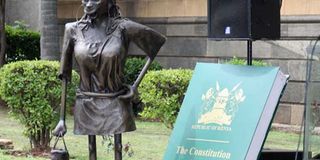Only through proper deployment of politics can Kenyans succeed

If now, more than 50 years since an extremely costly independence struggle, corruption, crime, ignorance, insecurity, poverty, tribalism, etc, are still actually spiralling, what then did we fight Britain for? How has Wanjiku benefited? FILE PHOTO | WILLIAM OERI |
What you need to know:
- How many of Kenya’s politicians would you say are attractive, knowledgeable and dab-handed?
- Politics is the only instrument by which we can put paid to all these social diseases.
This week, certain politicians of the ruling Jubilee coalition tried to convince Kenyans that what we need is not “politics” but only “development”.
This dangerously false dichotomy between “politics” and “development” was their rejoinder to the referendum demand by the opposition Cord coalition.
No, even I am not a referendum enthusiast. Yet my question to the Jubilee spokesmen is urgent: If “politics” is what stinks so disgustingly in your nostrils, why on earth are you yourselves so firmly in politics? No, politics is not the culprit. Politics is simply the struggle between individuals or groups for social control.
Collins defines politics as “the art and science of government”. Yet art implies beauty and savoir faire, and science implies knowledge and skill.
But how many of Kenya’s politicians would you say are attractive, knowledgeable and dab-handed? Ever since the rise of civilisation, the political state is the only mode in which the human society can exist.
Yet the only thing I can say for civilisation is its ever-expanding and ever-sharpening techno-scientific content. In proportion as science and technology grow, however, in the same proportion do economic inequity, political injustice and social immorality also spiral.
In what way, then, is Kenya a civilised society? How far have we developed since independence in scientific and technological terms and in terms of material plenty, financial equity, political justice and social morality since 1963? Are we anywhere near the point at which we can declare victory over corruption, crime, IDPs, ignorance, insecurity, poverty, tribalism?
Haven’t these scourges, in fact, intensified manifold since independence? Haven’t a million others reared their hideous heads, including Aids, spouse battering, throwing new-born babies to the wild dogs, grabbing land from old women, killing all of one’s children for one crazy reason and another?
Isn’t that why a colonial European diehard continues to assert in this very newspaper every week that the same British rule that introduced most of these radical evils to us was godsend and should have continued permanently? If corruption, crime, ignorance, insecurity, poverty, tribalism, etc, have actually intensified, doesn’t even he have a point?
POLITICS THE ONLY INSTRUMENT
But here is the nitty-gritty. All these are political questions. Politics is the only instrument by which we can put paid to all these social diseases.
Colonial Britain’s gross injustice consisted precisely in that, politically, it stirred to tackle these problems only as far as they concerned a certain class of Britons.
The indigenous people merely carried the ever increasing burden of the effluent of these raced-based socio-econo-political purposes. The reason the mass supported the nationalist class was its declared purpose of using politics to rid all classes, genders, races, religions and tribes of all these scourges.
Hence the question: If now, more than 50 years since an extremely costly independence struggle, corruption, crime, ignorance, insecurity, poverty, tribalism, etc, are still actually spiralling, what then did we fight Britain for? How has Wanjiku benefited?
If our politics still revolves around the tribe — if it continues to ignore everything else for which our mothers and fathers lost their lives in the fight for independence — where is that kind of politics taking us? In short, politics is not the problem. How you deploy politics, and with what purpose — that is the problem.
To define politics so narrowly as to equate it with the opposition’s demands — to claim that your own replies are not “politics” but “development” — is to degrade politics and abdicate your responsibilities in a manner unacceptable to all thinking Kenyans.
No, only by proper deployment of politics can we succeed in catalysing our development.





